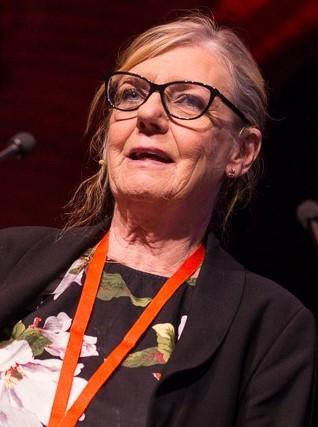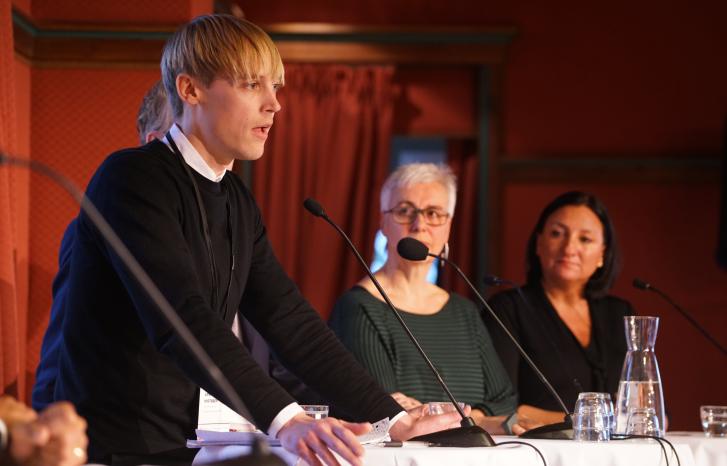Quantification, internationalization and efficiency enhancement. These terms are frequently used by politicians, rectors and research directors to promote arguments for excellence in research and teaching.
But change is on the horizon: More and more academics, both within and outside of Norway, are rising up against the dominant management ideology in academia. They see the current system as a threat to independent research, to students’ and employees’ well-being and mental health, and to equality, diversity and democracy.
They are now calling for a revolution in academic values.
A lack of compassion
One of them is Kathryn Waddington, a work and organizational psychologist from the UK. She thinks we need to talk about compassion, or the lack of it, in the current academic culture.
“Many of the major problems in academia with inequality, discrimination and discontent among students and employees are due to a lack of compassion – both with oneself and between students and university employees,” says Waddington, who is currently employed as a Reader in the Department of Social Sciences at the University of Westminster in London.
“However, compassion must not become a buzzword and just another item on the university’s checklist.”

Waddington links the lack of compassion with the privatization of higher education in the UK. Beginning in the 1980s and 1990s, the organizational management model known as New Public Management began to take hold in the Western higher education sector. Since 2010, government funding for British universities has been cut even further, and the universities have had to increasingly compete for both research funding and students.
As a result, both teaching and research have been subject to a “value for money” principle, measured by predefined quality indicators. Such a profit and efficiency system also affects the organizational culture and social relations among students and employees, according to Waddington.
“Instrumental social relations dominate in academia today. People become a means for achieving an end, rather than having an intrinsic value. Collective values and compassion are stifled in such an environment,” says Waddington.
She refers to a working environment survey carried out by Times Higher Education in 2014, in which one-third of the respondents said that they felt their subject area was not valued by the university and almost half found it difficult to make their voices heard. Many also expressed concerns about bullying in the workplace and the use of temporary employment.
“This trend has only become more pronounced since 2014,” says Waddington.
A perspective for understanding power
In order to reverse this trend, educational institutions and their leadership must create a culture that embraces compassion as a core value, Waddington believes.
“Compassion reflects feelings of deep sympathy and concern for individuals who are troubled by misfortune, accompanied by a strong desire to alleviate their distress. In addition, true compassion must always involve action. It’s not enough to feel compassionate: You must do something about it.”
To “do something about it”, organizations must develop critical analyses of power relations, decision-making processes and values within the organization, Waddington claims: Who benefits from the universities’ values as they are today? Is it easier for some to achieve the objectives? Who and what have been forgotten?
Managers need to initiate critical analyses to better understand how categories such as gender, social background and ethnicity work together, and affect the everyday life of those who work and study in academia.
Leaders have a special responsibility in this regard.
“Managers need to initiate critical analyses to better understand how categories such as gender, social background and ethnicity work together, and affect the everyday life of those who work and study in academia. This requires courage, as compassion may involve challenging established practices and rules.”
The idea that gender, class, ethnicity, sexual orientation, age and disability interact and give some people privileges, while others are subject to discrimination and exclusion, is referred to as intersectionality. Waddington believes compassionate organizations will be able to strengthen their intersectional work.
“Compassion helps us to see and hear those who fall between the gaps of overlapping and intersecting social identities, which we may not notice in a more individual-oriented performance culture.”
A valuable approach in Norway as well
Since the 1990s, Norwegian universities and university colleges have also been increasingly managed according to the New Public Management model. According to working life researcher Bente Rasmussen, the rush to produce excellent research has transformed the institutes into production units. They must recruit star candidates and develop researchers that take sabbaticals abroad and publish the most articles possible in highly ranked international journals.
In order to compete for external research funding, the research is angled towards strategic areas of society, where there is money to be gained. This threatens the independence of research, according to Rasmussen.
“Norwegian academia also needs a compassion revolution,” states Siri Øyslebø Sørensen, an associate professor at the Norwegian University of Science and Technology (NTNU).
She is head of the Centre for Gender Studies at NTNU and conducts research on power in organizations. Like Waddington, she believes that the compassion perspective is a call to action.

“When we talk about concepts like solidarity, care and compassion, we stand at the interface between having sympathy with someone in a marginal position and actually being willing to sacrifice something. Maybe some of us must be willing to forgo our privileges and wealth to bring about change,” says Sørensen.
Last year, Sørensen and her colleagues in the NTNU GenderHub research network organized a seminar series on gender, policy and institutional critique. They wanted to explore whether there is a feminist policy alternative to the New Public Management model.
“We have seen a generational shift among gender researchers, which we also see among other researchers. The younger researchers work within a framework that makes them more competitive and individualistic than the senior researchers, and they feel more pressure around publishing and internationalization,” says Sørensen.
She adds that this applies to all junior researchers, both women and men.
Weakens the university as a democratic institution
In order to succeed based on a narrow set of criteria, the leading researchers end up being rather similar, according to Sørensen. As a result, researchers with other kinds of life experiences and ideas about what constitutes scientific activity are not given a chance, and therefore the institutions become less democratic.
“If you think that knowledge production is a neutral practice, you will surely think that you will get the best research if you cultivate the elite who are willing to sacrifice everything. But if you want there to be a democratic aspect to research, it’s important to think in terms of representation,” says Sørensen.
Paves the way for diversity and equality measures
“But how can we go from talking about compassion to implementing concrete measures that expand the representation of people and perspectives in research?”
“Mainly by thinking in terms of relations and groups rather than individuals. Instead of expecting each individual to achieve in all areas, the leadership should find a way for the group as a whole to satisfy many of these criteria,” Sørensen responds.
She thinks compassion paves the way for a number of equality and diversity measures.
“Compassion allows us to think in terms of inclusion and opens up new ways of justifying recruitment. In working life in general, the managers taking recruitment decisions often hire people like themselves. In such cases, managers are responsible for asking questions like: Why do I prefer this candidate? Do I prefer him or her because it’s more convenient?”
The advantage of talking about a culture of compassion is that it places the problems in the environment and not at the individual level.
Compassion can also be used to address the working environment, and it can be used as a starting point for research design by striving to incorporate the perspective of others.
“Feminist theory and intersectional gender research have a lot to contribute in this area.”
“When we talk about compassion as an equality and diversity strategy, is there a danger that the efforts won’t be targeted enough?”
“Quite the opposite. The work will have a clear direction. But are we willing to put in the effort needed? The advantage of talking about a culture of compassion is that it places the problems in the environment and not at the individual level. It allows for the sharing of different experiences, which must be seen as a value in itself, rather than as a problem.”
Sørensen believes that a policy of categorization can create more challenges than solutions.
“Dividing people up into categories will always take the debate off track: Who should be counted? What should be counted? Who is a woman? Who is a minority? We should be talking instead about who has the power of definition, how they keep it, and how we can let more voices be heard.”
“Not superficial niceness and afternoon tea”
“Some might argue that it’s naïve to think you can change the culture as long as the universities must comply with requirements set by institutions such as the EU and the Research Council of Norway.”
“Of course the institutions must take responsibility. For example, funders like the Research Council have the power to set the agenda through their calls for proposals. They can transfer resources to marginalized subject areas and make room for perspectives other than the dominant ones,” says Sørensen.
“The universities can also think differently about their use of temporary employment if they replace benefit maximization with an ethics of care.”
We can’t sit down and say that we can’t do anything because the EU has said this or that, or wait for someone in a position of power to bring new ideas to the table. It’s important to begin the work with small, concrete measures at the departmental level and in research groups.”
The compassion perspective does not involve superficial niceness and afternoon tea:
“It has to do with necessary assessments and priorities, which can be experienced as rather uncomfortable.”
New University Norway takes up the fight
One of those with no plans of sitting down is the protest movement known as New University Norway (NUN). They are already gearing up for the revolution that will create the new university.
Inspired by similar movements in Canada, the Netherlands and the UK, a group of young academics at NTNU in Trondheim launched the movement back in 2014. Since 2016, New University Norway has increased its activity through the Protest Pub platform. They invite students, university employees and other interested parties to debate the university’s future on their own terms

“We observed that debates about the university’s role in society are often driven by various politicians and powerful actors. We want to take the fundamental issues back to the grassroots,” says Eli Smeplass.
Smeplass has helped to launch Protest Pub, and she recently defended her PhD thesis in sociology at NTNU. She is now employed on a six-month contract as a university lecturer in the Department of Teacher Education.
We are concerned about the structural conditions that underlie the neo-liberal management ideology used in our sector. The university has a more diverse social mission than producing the largest number of research and publication points possible, such as being an arena for independent research. This includes perspectives that are not always compatible with the market-orientation of the higher education sector.”
Academia of the future – for whom?
In 2017, Protest Pub organized the seminar “Academia of the future: For white men pushing 50?” at the House of Literature in Trondheim, where a number of academics, including Siri Øyslebø Sørensen, discussed the conditions in today’s academia that form the basis for who can have a career in research.
“Is academia of the future a place for white men pushing 50?”
“The point is that there are many strict prerequisites for what it means to be a successful researcher. The demand for international careers and high publication scores, for example, have adverse consequences for gender equality among academic employees.”
“A few years ago, Bente Rasmussen showed in an article how employment processes for academic positions favoured men. In her study, the hiring committee was instructed to base its decision on publication points for the last five years, and parental leave was not taken into account. As a result, young women who had taken maternity leave scored lower on the hiring criteria.”
Translated by Connie Stultz.
This article was first published at kifinfo.no.
The UK:
- Kathryn Waddington is a Reader in work and organizational psychology in the Department of Social Sciences at the University of Westminster, London.
- She gave the presentation Seeing intersectionality through the lense of compassion at the STEMM Equality Congress in Amsterdam last autumn. There she argued that compassion paves the way for a number of equality and diversity measures in academia. Click here to view her presentation.
- Encouraged by Waddington and others, Westminster University has now included compassion as one of the university’s three core values. The university is affiliated with the Darwin International Institute for the Study of Compassion (DIISC) – a global network of higher education institutions that advance studies and research on compassion in a variety of subject areas. DIISC has its own grant scheme for master’s and PhD students.
Norway:
- Last year, Associate Professor Siri Øyslebø Sørensen and her colleagues in the NTNU GenderHub research network organized a seminar series on gender, policy and institutional critique. They wanted to explore whether there is a feminist policy alternative to the New Public Management model.
- New University Norway (NUN) is a protest movement which was formed in 2014. Through the Protest Pub platform, they invite students, university employees and other interested parties to debate the university’s future on their own terms.



